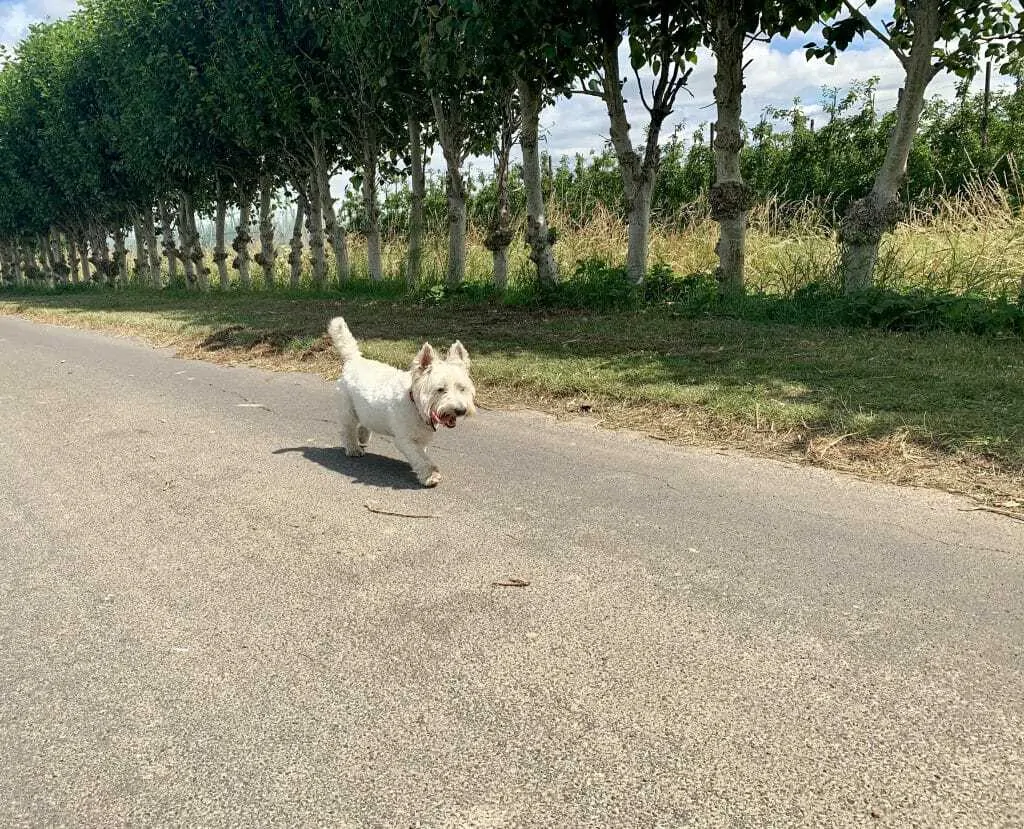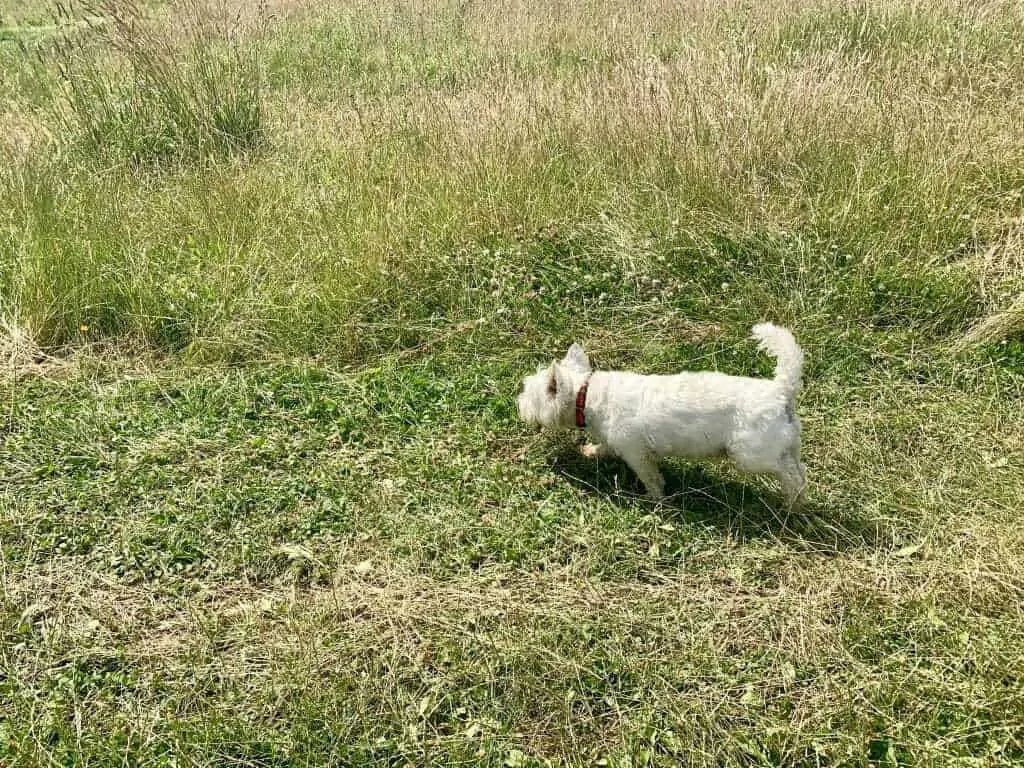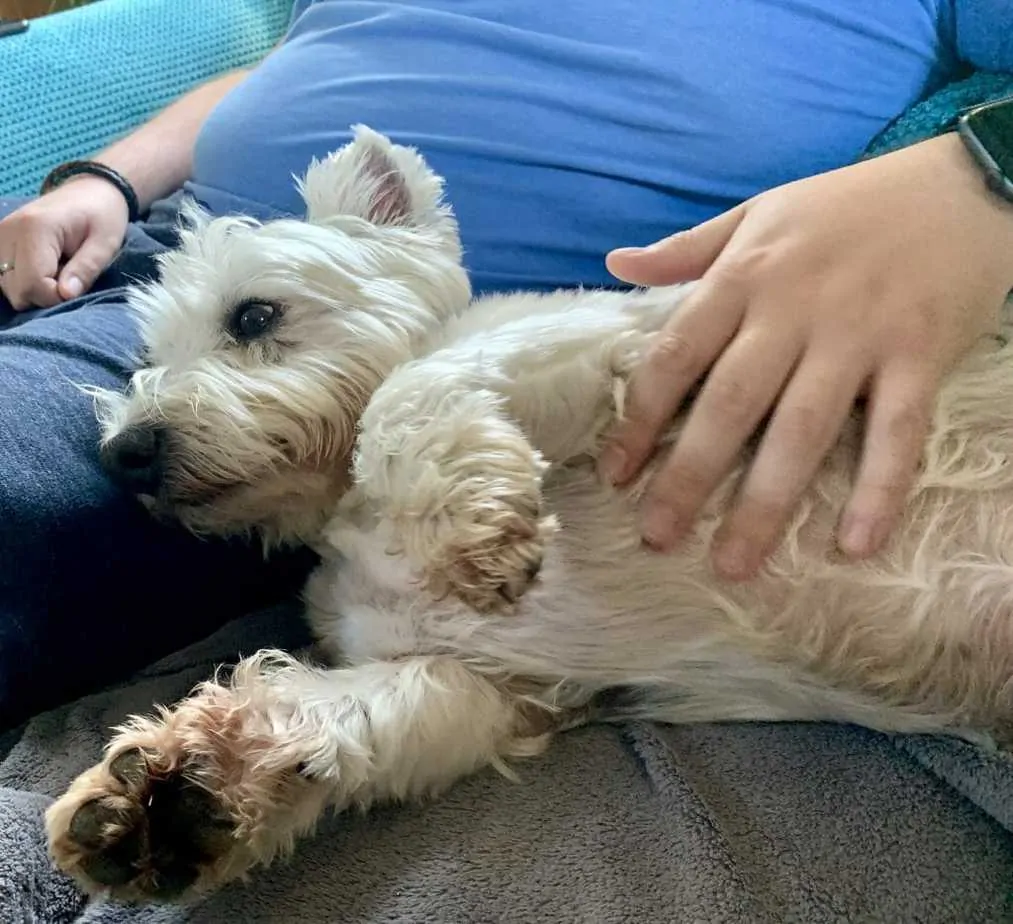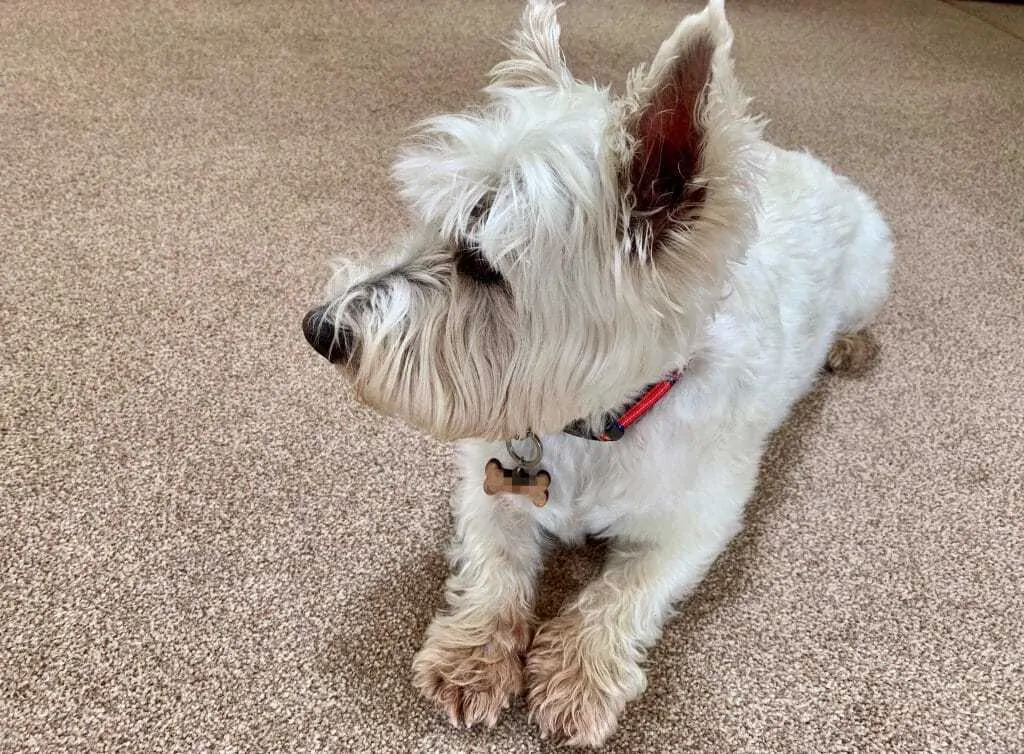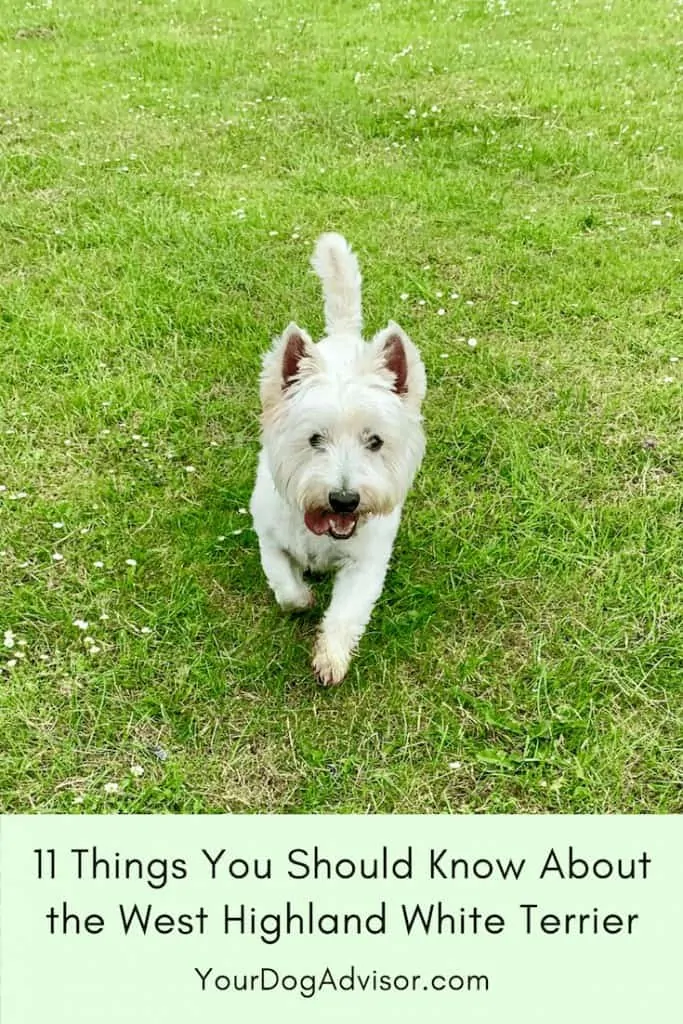The West Highland White Terrier, more commonly known as a Westie or Westy, is a small dog with short legs and a longer body. They’re playful, adorable and full of self-assurance.
These fluffy little pooches have wavy white fur that’s packed with density. Their eyes, mouth and nose are dark to contrast their coat and their tails are sturdy. They originated in Scotland and were bred to hunt, so they are naturally alert and slightly nosy. They’re part of the Terrier breed and typically live between 12 and 16 years.
Male and female Westies come in different shapes and sizes. The male Westie averages 15 to 20 pounds and stands 10 to 12 inches tall. A female Westie on the other hand averages 13 to 16 pounds and stands 9 to 11 inches tall.
Before deciding to bring a Westie into your home, there’s several things that you need to know about this Terrier breed. It’s important to note that all dogs come with different temperaments, personalities and traits. Everything that I discuss in this article is based on my experience with the breed, research about them and knowing Westie dog owners.
Charlie, the Westie I look after, is usually happy to stay indoors and play with a toy!
Contents
1. They’ve got a lot of independence
If you ever meet a Westie, you may notice that they are quite independent creatures that have little interest in anything other than what’s in front of them. They’re very smart and inquisitive and due to this I think it’s in their nature to be independent dogs. They have an aura about them that lets you know that they think they’re the boss.
Although they’re independent dogs, do not be afraid to show your Westie that you’re in charge!
I look after a lovely little Westie called Charlie. Before looking after Charlie, I’d never had this breed of dog myself so I was not sure what to expect. I was used to bouncy, crazy dogs that were overexcited. Charlie however, certainly had a happy presence to him but it was easy to tell he liked to lead the way.
Charlie loves having the freedom to roam around in an open area.
2. Everything is on their terms
Due to their independence, Westies like things to be on their terms. From my experience with Charlie, they’re quite stubborn dogs that like to do things only when they are ready. Even from walking Charlie in the park, it’s easy to tell when he’s had enough or wants more.
A typical example from my walks with Charlie is playing fetch. There’s no point throwing the ball for him to just have to fetch it myself instead. Sometimes, just sometimes, Charlie will tease me… He will get hyped up when I squeak the ball and once I’ve given it an almighty throw he will run after it. The catch is however, he’ll stop half-way as if to say: “Well, you threw it so you better go and get it!”
Teaching them to obey you from an early age can help ensure that you have a positive experience when out and about in parks, where your Westie will be let to run free.
As they can be stubborn and independent dogs, it is vital that they are trained from an early age to ensure that any commands taught continues through to their adulthood. It is important to remember that Westies could potentially adapt easily with continuous training.
Sniffing through the fields is always a great pass-time for Charlie.
3. They could be buddies with children
As noted further up, all dogs are different. The same goes for children as well as dogs and children spending time together.
Naturally, when we do not know what something or someone is going to do, we have a defence mechanism. This is the same for dogs. Westies dislike having their personal space invaded which means that they may not be the best breed of dog for very young children. This is something I know to be true from my experience with Charlie too, as I’ve seen him prefer to have his own space.
Interaction in the right way with a Westie is key. Westies still have plenty of playfulness though, which means that they could potentially be great company for older children who can consciously respect a dog’s wishes.
With any dog, you must take into consideration their tendencies, their history and their reactions. If you already have a Westie and are not sure whether they will get along with a child, it’s best to simply make sure that they are supervised at all times to avoid any potential negative situations. Make sure you read up on how to keep a harmonious relationship between children and canines.
4. They love attention
Charlie absolutely loves a belly rub, plenty of scratches under his chin and lots of strokes along his back. Although he does not tend to sit on our laps, he does enjoy to snuggle up next to my legs and be made a fuss of.
The only thing I have noticed with Charlie, which his owner’s told us about first, is that he does not like too much fuss at once. As an independent dog, he likes to be in control and so he does not enjoy being man-handled! However, scratch him in the right place and he will be your friend until he finds something better to fill his time with.
If he’s got a squeaky toy though, there’s no hope for any doggy love for at least an hour. He’s too engrossed in the squeak!
He loves a good belly scratch while we’re sitting on the sofa!
5. They think they’re bigger than they are
I don’t know about you, but I’d say Westies are relatively small. Due to their huge ego, they genuinely seem to act like they’re big dogs. They definitely like to act as if they are the leader, too.
Charlie seems to really enjoy the company of bigger dogs in the park. Don’t get me wrong, he can tolerate small dogs and will happily say hello to other dogs his size if he’s not too busy doing something else. I’m not exactly sure why he does like big dogs so much but that’s what tickles his playful spirit, so who am I to argue?
6. They do not need too much exercise
Due to their size and nature, Westies do not really need too much exercise. Two 30 minute walks a day will be plenty. This can vary depending on how they are feeling and what time of the year it is.
Choosing the right kind of exercise for your Westie is important to keep his heart, head and body healthy.
However, my experience with Charlie has shown me that he does not really mind how far he goes! Whether we take him for a walk around the block, a run around the park with his ball or a trod through the fields for an hour, he’s content.
Regardless of walk time, Charlie seems perfectly happy to lounge around the house with me or chill out while I get housework done. Westies certainly do not seem to be too demanding in terms of exercise, so if you’re after a dog that is not too active, Westies might be a good fit for you.
One thing I would mention is that Westies are good at digging and chasing a scent. This is because they were bred for hunting, which means they needed to be attentive and heard from underground once they had caught their prey. Therefore, it might be worth ensuring that your Westie does not develop a habit of digging up the garden and making sure you know how to prevent it!
7. Be cautious off a lead
Westies have strong chasing instincts. When we’ve been out with Charlie, he particularly likes to chase things such as tractors and trains. It’s important to stay alert with Westies, simply because they do like to chase things that give them an impulsive interest.
Charlie may not be bothered by sheep but you can bet if he hears a train somewhere, he’ll want to bolt off and try to keep up with it. This happens regardless of him being on or off a lead, so we do have to keep a close eye despite where we are, especially if we’re in an unknown area.
8. Their ears are naturally upright
This may be obvious to some people but I admit that before I’d met Charlie I never researched why some dogs ears are upright and others not. I’ve always been used to dogs with floppy ears, so Charlie’s ears were new to me.
I noticed that when I stroked Charlie’s head, his ears would go down as I brushed over them. I then started to notice that even when sleeping, his ears were still up. Animal Behaviour College explained that dogs with upright ears, also known as ‘prick ears’, are especially good at picking up sounds from far away. It also means that they can move their receptors to the direction of sound without even having to move their head. Impressive, right?
Charlie’s ears are naturally upright.
If you read up about the body language of a dog, you’re likely to find a lot of information about their ears. Although dogs often put their ears back when scared, it can also mean several other things. It’s important to look at your dog’s whole body when considering their emotion.
For example, when I pet Charlie’s head, his ears do go back but this is in a friendly-gesture kind of way. It’s to let me know that he is happy for me to stroke him. If I saw him with his ears and tail down and looking a little rigid, I’d be concerned.
As a side note, those of you who are considering getting a Westie puppy, do not be concerned if your puppy’s ears are not upright straight away. This takes a little bit of time as Westies gradually train their ears to stay up.
9. They’re prone to White Shaker Syndrome
Some of you may have noticed that some small dogs have a tremor in parts of their body. This could be a sign of White Shaker Syndrome which is also known as steroid responsive tremors or generalised tremor syndrome. VCA suggested that this syndrome is likely to develop when they are only one or two years old. However, it can develop later in life too.
Westies, along with other small white-haired fluff pups like the Bichon Frise suffer with this problem.
Charlie appears to suffer from tremors in his back legs and I have mainly noticed this when we’ve been walking for a little while. Having had x-rays at the vets, everything seemed normal so it is unclear whether he suffers from this. He definitely appears as if he is shaking, which is a key symptom of the syndrome.
Many dogs can live a normal life but it’s always best to get these things checked out with a vet if you start to notice any changes in your dog. This is so that they can rule anything else out.
10. They do not moult an excessive amount
With any dog, moulting (the shedding of hair) can vary. All dogs need to be groomed with the right products that suits them and their hair type.
On discussion with others and my experience with Charlie, I’ve noticed that Westies do moult, as most dogs do. However, compared to my experience with Labradors, where their hairs can be found almost anywhere, Charlie’s moulting is fairly minimal.
Do I find his hairs around the house or on his blanket after I’ve been stroking him? Yes! It is not too much hair to handle though. As someone with extremely thick hair, I think I’m more likely to find my own hair around the house than his. Then again, I do have a lot of hair…
11. They’re devoted creatures of habit
As independent as they are, Westies are devoted doggies. My experience with Charlie has shown me that although he is stubbornly independent, he is devoted to those who give him time and affection. The relaxed and friendly look on his face tells me that he is a happy dog.
Charlie seems to easily adapt to who he is with, providing he does not get any bad vibes from them. However, it’s easily noticed how he adapts to the human he is with. For example, Charlie’s owner usually takes him in the car before a walk and therefore, when leaving the house with them he is so stubborn to walk away instead of drive away. Walking out the house with someone else is a whole other story.
You can tell when a Westie is happy by their relaxed body language.
Having not owned a Westie myself, I can now see why someone would want to have one as their beloved pet. They’re pawsome! They make great company and love to do whatever you want to do, even if that’s sunbathing in the garden.
Having Charlie around is a pleasure and we love him as if he were our own. He’s affectionate, funny and challenges us to be the boss!
To summarise, here are the main points about Westies:
- They can be very affectionate
- They have a stubborn nature
- They are fiercely independent
- They are good chasers
- They only need a moderate amount of exercise

